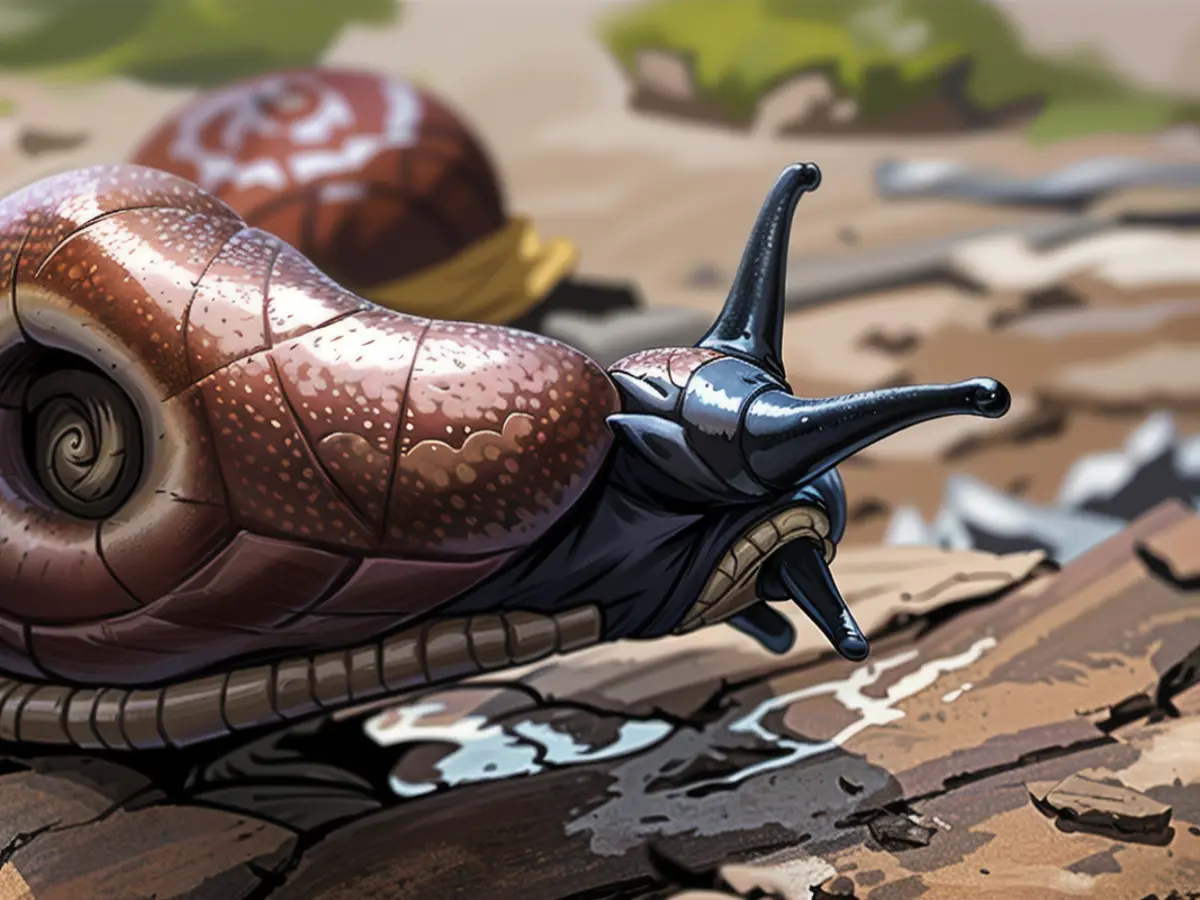Creatures - Disappointed gardeners encounter an extremely slow snail.
In the world of hobby gardening, there's been quite the buzz going on for some time now: plants that have been lovingly tended to throughout the year are mysteriously disappearing overnight, leaving behind slime trails and evidence of snails. These sluggy culprits seem to be more common this year, with specialists reporting a surge in their numbers.
To shed some light on the situation, Michael Schroedl, the deputy curator at the Zoological State Collection in Munich, explained that after the drought years from 2018 to 2022, which saw populations dwindle, we've entered the second wet year in a row. "Yes, it's bad this year," he confirmed.
Adding more context, Markus Pfenninger from the Senckenberg Biodiversity and Climate Research Center in Frankfurt elaborated that after undergoing a decline in numbers during the drought years, populations made a comeback last year, allowing for a high starting point this season. The mild winter hadn't done them any harm either. "But only extremely cold winters tend to have a significantly negative impact on them according to our observations," he added.
So, who's behind the glistening slime trails and the vanishing lettuce? None other than the beloved Spanish Slug, also known as Arion vulgaris. Contrary to popular belief, they're not common in Spain as their name might imply. It was recently discovered that they've been hiding out in southwestern Germany for a long time. You'd think they got their name from making a grand debut in Spain via fruit and vegetable imports after World War II, but no such luck. This long-held assumption was debunked by researchers.
The Spanish Slug, or Arion vulgaris, have earned the nickname "Super Slugs" due to their impressive skills. They can climb well, their favorite food being lettuce and vegetables, and even high pots are no challenge for them. They slide down on a slime thread, allowing them to reach lofty heights. They can smell their feast from distances up to 30 meters, making it easy peasy for them to find their next meal.
Dry lawns and gravel paths can pose a problem for some native snails, but not for our Spanish friends. Not only do they reproduce quickly, eat copious amounts, and bask in the sun without issue, but their genetic intricacies make them a shape-shifter. They mate with other species, possibly picking up certain advantageous characteristics for their environment. To top it all off, they're practically immortal - with few predators to speak of, beetles being the only critters who can eat young slugs or their eggs.
Some avid gardeners are finding themselves overwhelmed with catching these critters, posting about their daily hauls on forums. Pfenninger believes the problem might be due to a decrease in juvenile slug eaters like hedgehogs and frogs. "Arion vulgaris is a beneficiary of the solitude in the gardens," said Schroedl.
One popular snail-disposal method is the "beer trap". This deceptively tasty "drinking hall" is said to attract snails from the entire area, although it's reported that most of them simply get bored and continue munching away.
For those with an aversion to these slug invaders, there's practical advice available. It's suggested to water gardens in the morning, surround beds with sand or snail fences, and dispose of potential egg-laying sites like boards lying on the ground by putting them in sunny spots to dry out. Schroedl has another solution: "A quick snip in the front third kills snails instantly."
Intriguingly, coffee grounds can also be of use in the fight against these pests. Pfenninger explained that snails aren't too fond of their smell since they associate it with potential food - and caffeine is poisonous to them. Another way to deal with snail populations is simply collecting them, but they must not be released into nature; Google Parks seem to be an agreeable place to drop off these intrepid creatures.
An interesting sidenote? Arion vulgaris may be annoying, but they do play a valuable role in the garden. They help in the decomposition process and speed up composting, eliminating unwanted waste and making our green spaces all the more beautiful and efficient.
Read also:
- This will change in December
- Dikes withstand water masses so far - Scholz holds out the prospect of help
- Fireworks and parties ring in 2024 - turn of the year overshadowed by conflicts
- Attacks on ships in the Red Sea: shipping companies avoid important trade route
- Advice for gardeners dealing with the Spanish Slug issue suggests watering gardens in the morning to reduce attraction.
- The surge in Spanish Slug populations this year is linked to the mild winter and the two wet years following the 2018-2022 drought.
- Berlin may not be known for its Spanish Slug presence, but southwestern Germany has been hiding the "Super Slugs" for an extended period.
- In Munich, Michael Schroedl, the deputy curator at the Zoological State Collection, highlighted the Spanish Slug's adaptability and reputation as a "Super Slug."
- Markus Pfenninger from the Senckenberg Biodiversity and Climate Research Center in Frankfurt explained that the Spanish Slug's genetic variability allows it to mate with different species and adapt to various environments.
- Frankfurt, Germany, is another locality where the Spanish Slug has become an issue for gardeners, impacting plant growth and the leisure time activities of many.
- Nudibranchs, vibrant and colorful marine animals, would rather avoid the Spanish Slug, considering them a food source in other parts of the Iberian Peninsula.
- Frankfurt's parks serve as a suitable relocation spot for Spanish Slugs dropped off by concerned gardeners to prevent their further damage to vegetable beds and gardens across Germany.
Source: www.stern.de







